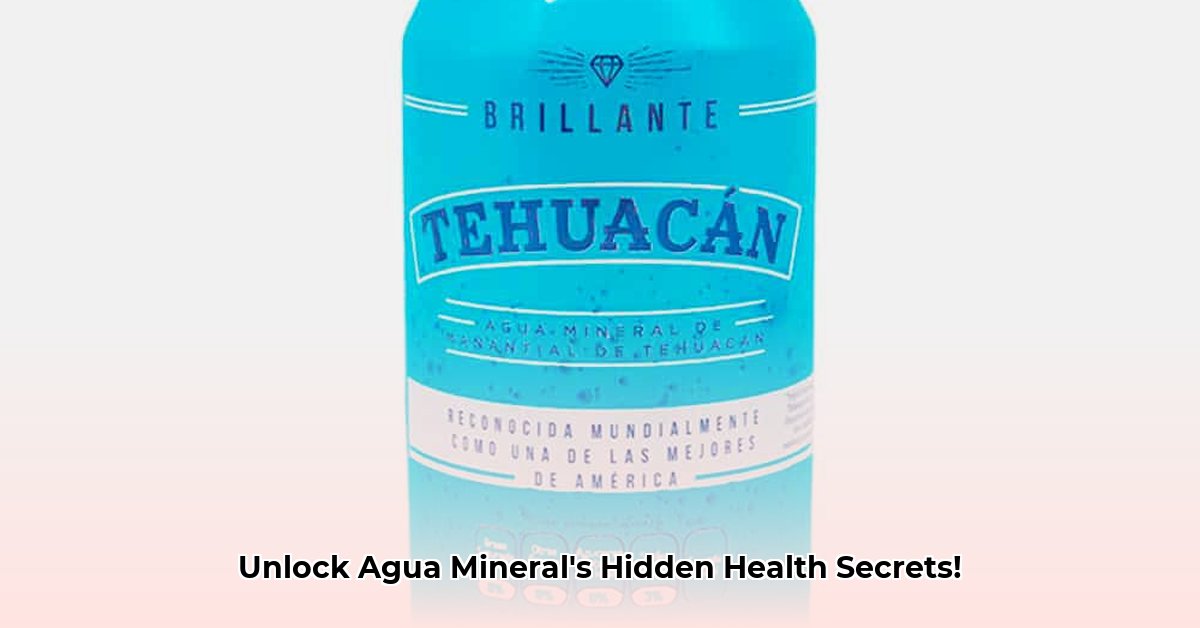So, you’re wondering about mineral water – agua mineral – and whether it’s really as good for you as people say? This guide will walk you through everything you need to know. We’ll compare it to regular tap water, look at the different types available, and help you figure out which one is best for you. We’ll also explore the science behind the health claims, separating fact from fiction, and give you tips on how much to drink and how to make it part of a healthy lifestyle. Whether you’re a health nut or just looking for a tastier way to stay hydrated, we’ve got you covered.
Agua Mineral: Your Everyday Guide to Understanding Mineral Composition
Let’s talk about agua mineral, that sparkling water you see everywhere. Is it a healthy choice, or just another type of water? We’ll explore the facts, the possibilities, and what you need to know to make informed choices about hydration and refreshment.
Dissecting Agua Mineral: What Sets It Apart from Standard Drinking Water?
Agua mineral, or mineral water, comes straight from the earth, naturally carrying various minerals and trace elements. Unlike tap water, which is treated and may have added chemicals like chlorine, mineral water’s composition is determined by the geology of its source. The specific mix of minerals varies depending on where the water comes from, giving each brand a slightly different taste and potential health benefits.
The Possible Upsides of Sipping Mineral Water and Staying Hydrated
Some studies suggest that certain minerals found in mineral water could provide health benefits. Here are some potential advantages:
- Bone Health: Mineral water can be a source of calcium, which is essential for maintaining strong bones and teeth. Some studies indicate that the calcium in mineral water may be more easily absorbed by the body than calcium from some foods.
- Blood Pressure: Some mineral waters are rich in magnesium and potassium, which are known to help regulate blood pressure.
- Digestive Health: The sulfates found in certain mineral waters may have a mild laxative effect, aiding in digestion and relieving constipation.
- Heart Health: Some studies suggest that the consumption of mineral water can improve cholesterol levels, potentially reducing the risk of heart disease.
Potential Drawbacks: Essential Considerations for Safe Consumption
Drinking too much mineral water could lead to some digestive issues, such as bloating or upset stomach, especially if the water is carbonated. The acidity in mineral water might also contribute to tooth enamel erosion, although generally less than sugary drinks.
Other potential downsides include:
- Sodium Content: Some mineral waters are high in sodium, which may not be suitable for people with high blood pressure or those on a low-sodium diet.
- Microplastics: Bottled water, including mineral water, may contain microplastics, small pieces of plastic that can leach from the bottle into the water.
- Cost: Mineral water can be more expensive than tap water, especially if you buy it regularly.
Mineral Content: How Does Mineral Water Improve Hydration Levels?
One thing to keep in mind is that the mineral content varies enormously from brand to brand. Check the label for information on the specific minerals and their amounts.
Here’s a breakdown of some common minerals found in mineral water and their potential benefits:
- Calcium: Important for bone health, muscle function, and nerve transmission.
- Magnesium: Helps regulate blood pressure, blood sugar, and nerve function.
- Potassium: Essential for maintaining fluid balance, nerve function, and muscle contractions.
- Sodium: Helps regulate fluid balance and blood pressure.
- Bicarbonate: Can help neutralize stomach acid and improve digestion.
- Sulfate: May have a mild laxative effect.
Making Smart Choices: Incorporating Agua Mineral into Your Daily Life
Agua mineral is a hydrating drink and a good alternative to tap water. However, it’s not a replacement for a healthy diet and lifestyle. It’s best to consume it in moderation as part of a balanced approach to hydration and nutrition.
Your Action Plan for Enjoying Agua Mineral and Optimal Health
Here’s a simple guide to make the most of your agua mineral experience:
- Read Those Labels Carefully: Pay close attention to the mineral content listed on the label to help you make informed decisions. Look for brands that are low in sodium and high in beneficial minerals like calcium and magnesium.
- Drink in Moderation: Find the sweet spot for your body, as excessive consumption could lead to digestive discomfort. Pay attention to how your body reacts to different brands and adjust your intake accordingly.
- Listen to Your Body: Cut back on your intake if you feel any discomfort after drinking mineral water (bloating, stomach ache, etc.). If you have any underlying health conditions, consult with your doctor before making significant changes to your diet.
- Talk to Your Doctor or Registered Dietitian: Chat with a healthcare professional about incorporating mineral water into your diet, especially with pre-existing conditions. They can provide personalized recommendations based on your individual needs and health status.
- Consider the Environmental Impact: Choose brands that use sustainable packaging and production practices. Look for bottles made from recycled materials or consider using a reusable water bottle and filling it with mineral water from a larger container.
Agua Mineral: Weighing the Pros and Cons for Optimal Results
Let’s summarize the potential benefits and drawbacks:
| Pros | Cons |
|---|---|
| Excellent hydration source | Possible bloating or digestive discomfort |
| May support bone health | May contribute to tooth enamel erosion |
| May aid digestion | Variable mineral content; effects vary by brand |
| Naturally sourced | Not a replacement for a balanced lifestyle |
| Source of essential minerals | Some brands high in sodium |
| Can be a healthier alternative to sugary drinks | Potential for microplastic contamination |
The Bottom Line: Savoring Responsibly and Understanding Electrolyte Balance
Agua mineral is a refreshing and potentially beneficial beverage, so it’s crucial to be informed and use moderation. Choosing wisely and listening to your body are key to enjoying its potential upsides while minimizing any potential downsides.
How Much Mineral Water Should I Drink Daily for Optimal Health Benefits and Improved Electrolyte Levels?
Key Takeaways:
- Mineral water, with its varying mineral content, might offer health advantages, but more research is needed.
- Individual needs, such as sodium sensitivity and digestive tolerance, must be considered.
- Drinking mineral water can contribute to your daily mineral intake, but it shouldn’t be your only source.
- How much mineral water should I drink daily for optimal health benefits is a question best answered by considering your individual health needs and consulting with a healthcare professional.
Understanding the Mineral Magic and Improved Health
Mineral water isn’t just regular water; it’s enriched with naturally occurring minerals like calcium, magnesium, and potassium, but does drinking mineral water translate directly to better health? Studies suggest a correlation between mineral water consumption and improved health markers like blood pressure, bone density, and digestive function. However, it’s essential to interpret these findings with caution.
The Science (and the Skepticism) of Enhanced Hydration
While some studies show links between mineral water and improved cardiovascular health and digestive regularity, more robust, controlled experiments are needed to confirm these benefits. Confounding factors like overall diet and lifestyle make it challenging to isolate the effects of mineral water alone. Some experts also argue that the mineral content in mineral water is often too low to have a significant impact on health.
Navigating the Nuances: Sodium, Carbonation, and the Environment Consideration
The mineral content varies drastically between brands and sources. Some mineral waters are surprisingly high in sodium, a concern for people with hypertension (high blood pressure). Carbonation: bubbly water can be refreshing, but it might trigger heartburn for some. The environmental impact of bottled water, including mineral water, is also a growing concern. Plastic bottles contribute to pollution, and the production and transportation of bottled water consume energy and resources.
So, How Much Mineral Water Should You Drink for Better Hydration?
There’s no magic number, but your daily fluid intake should meet your individual needs, based on factors like activity level and climate. While mineral water can be part of a healthy hydration strategy, it doesn’t replace the need for a balanced diet and regular exercise.
General guidelines for daily fluid intake range from 2.7 liters (11.5 cups) for women to 3.7 liters (15.5 cups) for men, according to the National Academies of Sciences, Engineering, and Medicine1. However, these are just estimates, and your individual needs may vary.
Making Informed Choices and Balancing pH Levels
Instead of focusing solely on quantity, prioritize quality with low-sodium options if you have hypertension. Consider whether you tolerate carbonation well or prefer still water. Choose brands with sustainable packaging and production practices to minimize your environmental impact.
Ultimately, the decision of how much mineral water to drink is a personal one. Listen to your body, consider your individual needs, and consult with a healthcare professional if you have any concerns.
Agua Mineral Consumption: A Guide for Athletes to Enhance Performance and Recovery
Key Takeaways:
- Why Am I Always Thinking About Food? Your Body and Brain Explain - February 2, 2026
- Healthy Eating Is About Quality, Not Just Calories - February 1, 2026
- Healthy Living Products to Elevate Your Wellness Routine - January 31, 2026










